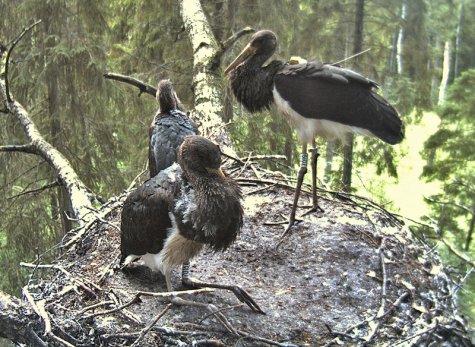Backpacks on backs… a Birthday of Miss Little
Yesterday before noon, on the birthday of Miss Little, the prior day's birthday boy (Mr. Middle, a.k.a. 7019) got, as is known in scientific circles, "backpacked." Installing the backpacks requires that the bird be completely dry, and it's also quite difficult for a human being to climb up a wet tree trunk! In recent days the weather has changed frequently. Since the camera needed a bit of adjustment, we decided to visit the nest the same day to affix the backpack.
Our first impression: success. We have not put backpacks on chicks before, but it's very necessary to know what they do to survive. Where do they spend their first years before they build themselves a nest? And what can we do to reduce the death rate of young birds?
About the backpack: The transmitter weights 45 grams and is placed on the back with a harness of teflon ribbon which is frictionless and doesn't decompose. It's important to leave room for growth when fitting the tag, because Mr. Middle isn't yet fully grown. The device records the bird's GPS coordinates every two hours during the day and then transmits them every third day to our Argos server. The backpack is powered by solar batteries, and for that reason the size cannot be tiny—solar panel size is directly related to its power.  Who's the most important here? Of course it's...
Who's the most important here? Of course it's...
This sort of device must last some years (as long as the wearer lasts). But our plan is to remove the packs after four years of wear, if the opportunity presents itself. In the beginning, this is only a theory…
In the evening hours Donna and Padis fed the chicks. Our small inconvenience was quickly forgotten and the storks' moods improved.
It began raining at 7 p.m. and in a couple of hours the storks saw five millimeters of rain. A season of such strong rains is hard to recall.








